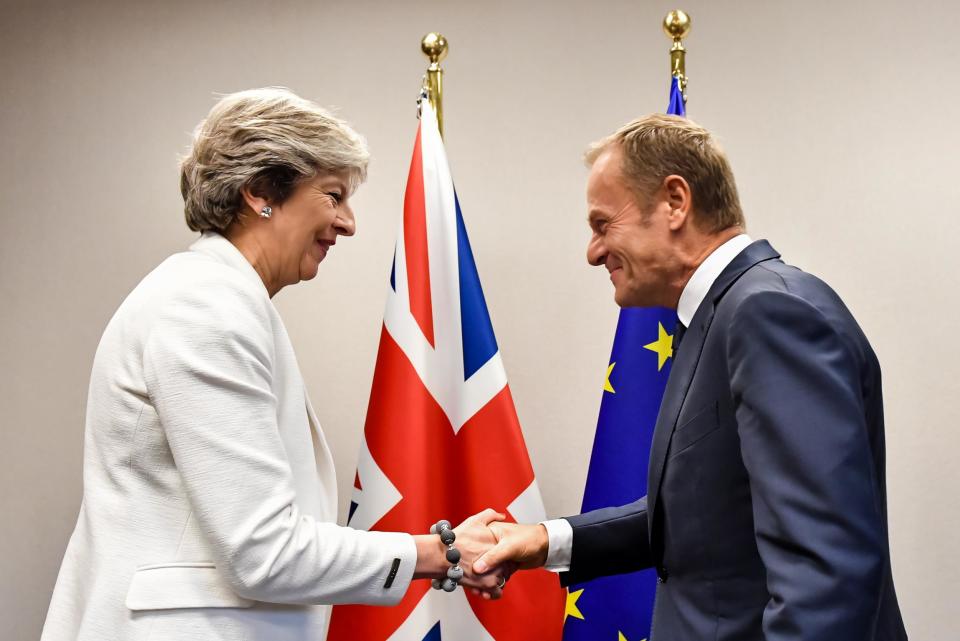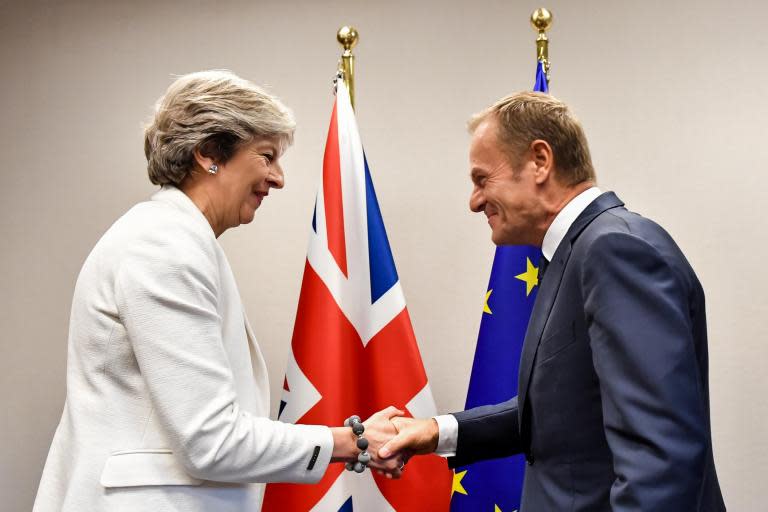We are being deceived by ministers about the Brexit negotiations – my trip to the European Council in Brussels proved it
Last week I visited the European Commission and the European Council in Brussels. I’ve also been meeting ambassadors from the 27 other member states of the European Union (the “EU27”) and have discussed Brexit with a number of senior British civil servants. These discussions lead me to one conclusion: Conservative ministers are deliberately deceiving the British people on the Brexit negotiations.
I have no problem with the Government being ambitious and wanting to get the best deal for Britain – we all share that goal. But I do take issue with ministers deliberately deceiving people and sowing the seeds of fantasy when, as the reality of Brexit becomes clear, it is open to the electorate to take a different view on whether we should press on with this process.
Donald Tusk, President of the European Council, and President Macron of France made clear last week that the British people are in charge and there is no political or legal obstacle to Britons choosing to stay in the EU if they don’t like the Brexit deal we end up with.
The starting point of the deception is to deny that the unsustainable red lines set out by the Prime Minister at Lancaster House last January – at the behest of the hard right of her party – are severely restricting the ability of Britain to get a decent deal from this process. Our EU counterparts have put a number of options on the table; Theresa May is the one ruling them out.
The single market provides for tariff-free trade between EU countries and a common framework of rules including employment rights, competition policy, consumer and environment protections. EU countries come together through the customs union and apply the same tariffs to goods from outside the union. Non-EU countries participate in both bodies and doing so is the best way of retaining the benefits of EU membership while being outside the EU.
The referendum result only told us whether a majority of voters wanted to remain in or leave the European Union. It did not tell us precisely on what terms and whether we should participate in the single market and customs union, an issue reserved to Parliament. Notwithstanding this, Theresa May has dictated that we have to leave both, despite putting this front and centre of her 2017 general election campaign and losing her majority as a result.
A recent poll conducted by BMG showed that while 60 per cent of those surveyed wanted to stay in the single market after Brexit, just 16 per cent thought we should leave it; 57 per cent wanted to stay in the customs union while just 16 per cent disagreed. Last week Frances O’Grady, the general secretary of the TUC argued we should permanently stay in the single market. Today Carolyn Fairburn, the director general of the CBI, argues we should permanently participate in the customs union. Why won’t the Government listen?
The stated of aim of the Government is to secure the exact same economic benefits that we enjoy in the EU. Italy is the third biggest country in the EU27 after Germany and France. Its Secretary of State for EU Affairs, Sandro Gozi, told me on my LBC radio show on Saturday that we will not be able to enjoy these economic benefits outside of the single market and the customs union. Yet UK ministers keep insisting otherwise.
You could view this simply as the EU adopting a tough negotiating position – nevertheless if they give us special arrangements, other third countries with whom they have agreements will demand the same too. For example, Norway has already warned that giving into UK demands for a special trade deal allowing different UK sectors to participate in the single market without being part of it would force Norway to rip up its own agreement with the EU.
Any post-Brexit trade agreement we secure with the EU will need to substantially cover services which make up 80 per cent of the EU economy. The Government is labouring under the misapprehension that we would be able to secure a free trade agreement (FTA) outside of the single market that not only covers goods (like the FTA Canada has with the EU) but most services too.
Again, Macron and Gozi made clear last week: you can only have this if you remain in the single market (sometimes also referred to as the “Norway model” or the “European Economic Area”). It almost unheard of to have an FTA – one that sits outside of the single market, at least – which covers most services because it would have to be approved by 42 regional and national Parliaments in the EU and domestic political objections in other states would stand in the way.
The last great deception is that the EU is preventing us from obtaining a bespoke agreement. There is a general acceptance that an agreement for any particular country is going to be “bespoke” because it would talk to the particular needs of the country as President Macron said on Saturday.
However, even though Theresa May and her ministers keep talking about the desire for a “deep and special partnership” and a “bespoke” UK deal, the Tories have failed so far to set out what they believe that bespoke agreement would look like because the Cabinet cannot agree on it.
There is also an inescapable practical issue – because May prematurely triggered Article 50 without working out so many of these details, there is simply not sufficient time to agree a properly bespoke deal. The FTA Canada has with the EU took seven years to negotiate and I’ve been told it would take at least four years for the UK to achieve a bespoke FTA as well.
The worse the deal, the greater the demand for the people to get a final say with the option to remain in the EU. That is at the root of the attempt to pull the wool over people’s eyes in this process. However, if the people started this process, surely they should be the ones to end it if the deal looks nothing like what they were promised at the end of this process.
New Year’s Resolutions
Last week, I asked readers to send in their advice on the key to keeping your New Year’s Resolutions. The best response came courtesy of Sheila Blakeman-Shead in Lincolnshire: “Keep them realistic to begin with. Think of a small step which would be an improvement, one small change for the better, and just start doing it. Also don’t think of it as a forever change, far too daunting. Just think ‘OK, I’m going to start doing this for now’.” Sheila’s best bit was: “Remember that your year can start any time you choose.”
So, if you are struggling, just reset the year and start again!
Chuka Umunna is a Labour politician who has been MP for Streatham since 2010

 Yahoo News
Yahoo News 

